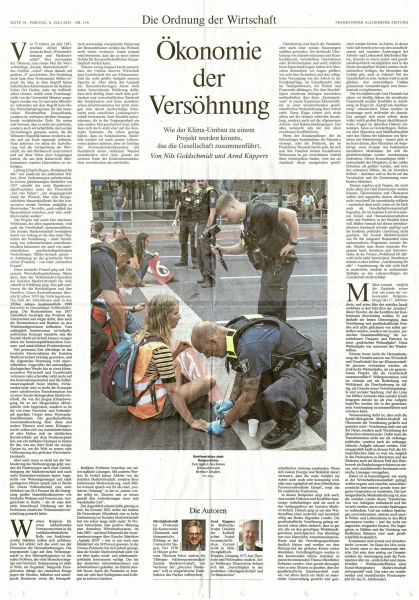Spiritual Stasis in the West
This interesting article, "Ökonomie und Versöhnung," by a Professor Nils Goldschmidt, appeared in the Frankfurter Allgemeine newspaper during my trip to Germany in July. It impressed me so much, I knew that I had to write about it and to recap its important points. The accompanying photograph shows sheltered, willowy young women dressed casually for a protest in the middle of a city-street, while police officers figure out what to do with them.
Ostensibly, they protest the factors that have caused climate-change and that impact the World's eco-systems, and they turn to the government for radical measures to return the World to a natural balance. Their meek, gentle features suggest, at the same time, a more personal protest fueled by a quiet, existential desperation.
Professor Goldschmidt's article suggests as much--that educated people in Germany no longer have confidence in their ability to solve future problems, because humanity has reached the end of the available potential for progress. What a scary thought, to give up freedom for fear of future disasters.
They describe life in the future as a "Postwachstumsökonomie," in which the society must carry on after reaching the limits of growth. Professor Goldschmidt says that Germans "vertrauen nicht mehr auf das Innovationspotential und die Selbststeuerungskraft freier Märkte." In English, it means that young Germans do not believe that further innovation in the context of a market-oriented economy can stave off "Weltuntergang," or the end of the world. The only way to prevent Weltuntergang is to scale back the freedoms of the marketplace.
Fortunately, a slim majority of Germans do not share this negativism, but they are mostly older Germans. Younger Germans, reeling from Weltuntergang models in the media, turn to government-fiat for solutions. Goldschmidt describes their desertion of the Market as a "schleichenden Verlust," a creeping decline in self-determination as a solution to anything.
The decline of Market-solutions, says Goldschmidt, will lead to "Kartellierungen," such as happened during the Weimar-era, when government-sponsored cartels killed competition and led to a "soziale Hierarchie" that split Germany into the clique connected to government power and everyone else--outside the spheres of influence.
Professor Goldschmidt challenges modern Germans to remember that Germany faced a far-greater challenge to its existence after World War II, when the nation reached "Stunde Null" (ground-zero). Germany had to recover from the effects of six and a half years of war, the loss of thousands of young men in the East and on the Western Front, and the destruction bombing by British and American air-forces, that destroyed the infrastructure of most cities.
With the revelation of the covert activities by Nazi leaders--the Death-camps, the wholesale slaughter of civilians, and its cynical disinformation campaigns to delude German citizens--Germans had to deal with a betrayal of civilized values, that left them with a burden of guilt, since their leaders had already died by execution, or else fled to other countries.
In East Germany, the Soviets deemed all business-owners as collaborators with the Nazis, and condemned capitalism as the force behind the Nazis. Since so many Jews in pre-War Germany owned their own businesses, the Soviet stance reminds me of a dog chasing its own tail, or the Nazi tail.
In West Germany, on the other hand, Chancellor Konrad Adenauer teamed up with economist Alfred Müller-Armack and Finance-Minister Ludwig Erhard, with financial support from the Marshall Plan, to create the "Sozialmarktwirtschaft," a capitalist economy with a safety-net; and it proved wildly successful.
East Germany, on the other hand, governed by "staatlicher Lenkungswirtschaft" (a state-centered economy) imploded into bankruptcy and had to rejoin West Germany, which had already surpassed its pre-War average-personal-income level by 1950. By 1970, Germany had one of the most profitable economies on the planet. Germany remains the test-tube nation of choice--two test-tubes--that has proven scientifically, so to speak, that socialism and Marxism failed; Sozialmarktwirtshaft succeeded.
Professor Goldschmidt contends that Germany should not employ an economic model that has failed miserably once, already. It should stay with the formula for success, with a proven track-record. If human ingenuity in a capitalist system can bring back Germany from the brink of a catastrophe like World War II, it can do most anything.

